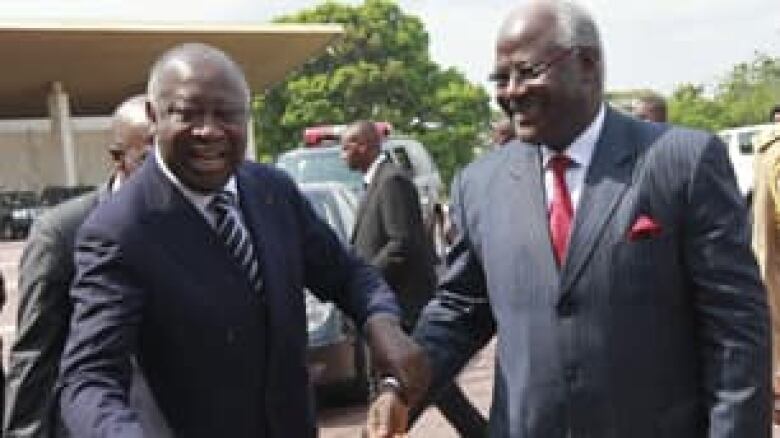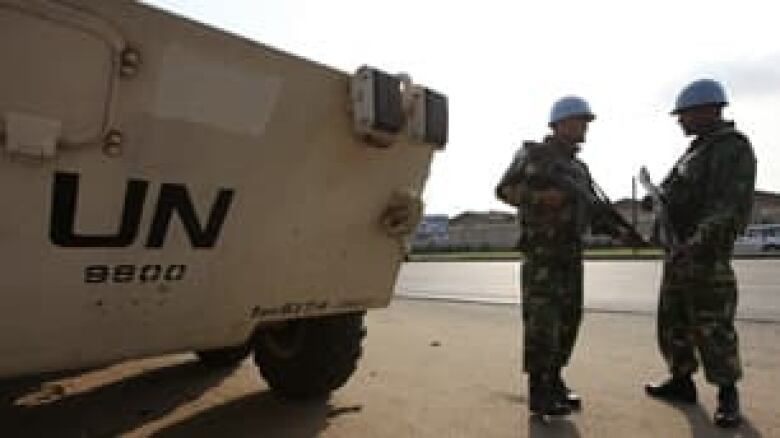West Africa leaders tell Gbagbo he must go
West African leaders delivered an ultimatum to Laurent Gbagbo in person Tuesday, after threatening a military ouster if he doesn't accept an offer to go into exile in a neighbouring country a month after Ivory Coast's disputed election.

The delegation was led by presidents from Sierra Leone, Cape Verde and Benin, who declined to comment to reporters after a three-hour meeting with Gbagbo.
The incumbent leader, who has been in power for a decade in Ivory Coast, has so far shown no interest in stepping aside, despite international calls for him to go.
The delegation headed next to the hotel where internationally recognized election-winner Alassane Ouattara is based. While Ouattara has been endorsed by most of the world, Gbagbo still maintains control of Ivory Coast's military and security forces.
The 15-nation regional bloc ECOWAS has threatened to use "legitimate force" if Gbagbo does not relinquish power. Nigeria has the strongest army in the region and is expected to play a major role if an operation is launched to oust Gbagbo.
Ouattara's camp has been confident in recent days that such help is coming.
"It's not a bluff," one senior Ouattara adviser said Monday on condition of anonymity because of the sensitivity of the matter.
"The soldiers are coming much faster than anyone thinks."

ECOWAS has intervened in past disputes, including the seizing of Sierra Leone's capital in 1998 that forced military junta leaders to flee and allowed an elected president to return to power. ECOWAS also intervened in Liberia in 1990 and its forces stayed for several years. And it has sent troops to Guinea-Bissau as well.
U.S. State Department spokesman Mark Toner on Tuesday commended ECOWAS's leadership, and said that the United States was prepared "to take even stronger actions such as financial sanctions as needed."
"The strong, measured response from both the [African Union] and ECOWAS to the Ivorian crisis demonstrates the pre-eminent role that regional organizations play in addressing crises," he said.
Weeks of post-election violence have left at least 173 people dead, according to the UN. The toll is believed to be much higher.
The UN said it has been unable to investigate reports of a mass grave because of restrictions on UN personnel movements.
The French government says its forces in Ivory Coast will protect French citizens but won't be making any decisions about an international military intervention.
Many Ivorians are terrified of Gbagbo's security forces. Human rights groups blame security forces associated with Gbagbo for hundreds of arrests and dozens of cases of torture and disappearances since the election. A Gbagbo adviser has said he does not believe his supporters could be behind the violence.
Gbagbo has been in power since 2000 and had already overstayed his mandate by five years when the long-delayed presidential election was finally held in October, with the run-off coming in November. The election was intended to help reunify a country that was divided by a 2002-2003 civil war into a rebel-controlled north and a loyalist south.
The UN was tasked with certifying the results of the election as part of a peace agreement that ended the civil war.
While Ivory Coast was officially reunited in a 2007 peace deal, Ouattara still draws his support from the northern half of the country, where residents feel they are often treated as foreigners within their own country by southerners.
The regional bloc ECOWAS is comprised of Benin, Burkina Faso, Cape Verde, Ivory Coast, Gambia, Ghana, Guinea, Guinea-Bissau, Liberia, Mali, Niger, Nigeria, Senegal, Sierra Leone and Togo.












_(720p).jpg)


 OFFICIAL HD MUSIC VIDEO.jpg)
.jpg)



























































































